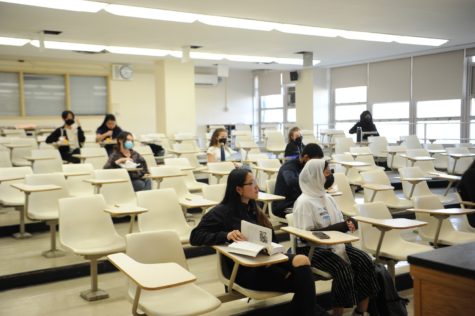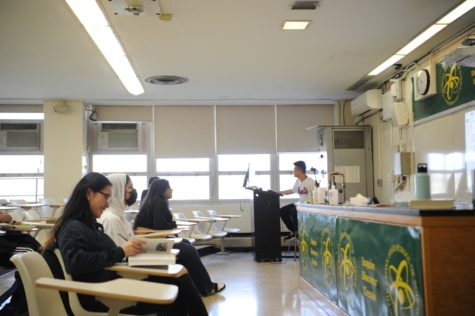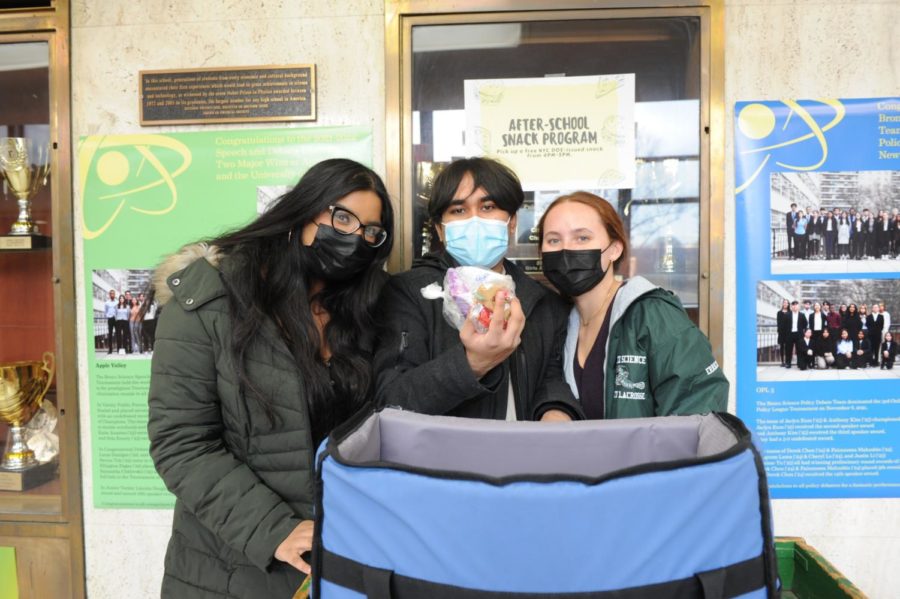The Creators of the After School Snack Program: The Nutritional Health Council
From the creation of the popular after-school snack program to improving meal quality in our lunchroom, the Nutritional Health Council has been hard at work this past year improving students’ diets, one bite at a time!
S.O. Chief of Staff Ahona Rana ’22, S.O. Vice President Allision Errico ’22, and S.O. Secretary Sudiptha Paul ’23 work together to hand out after-school snacks to students.
Over the course of our school’s history, Bronx Science has launched various programs, such as peer tutoring and SGI (Small Group Instruction). From student-led to faculty based, Bronx Science’s diverse array of offerings are a critical part of every student’s life. Yet nearly none are as successful as our new after school snack initiative.
Despite being launched just over six months ago, the after school snack program at our school has quickly become one of the most popular and beloved policies amongst students. Featuring foods such as tortilla chips, freshly-sliced apples, Chobani yogurt, pretzels, and animal crackers, the program mixes both tasty and healthy to create nutrition-rich and fun snacks for students.
However, in spite of the program’s popularity, the majority of students are unaware of the creators behind this popular initiative — The Nutritional Health Council.
The Nutritional Health Council (NHC), headed by S.O. Vice President Allison Errico ’22, meets on the second Wednesday of every month with Principal Hoyle, Ms. Cooper, Assistant Principal of Organization, and our school’s dietitian, Ms. Pichardo, to discuss the state of our school’s nutrition and reflect on what can be done to improve it. Students collaborate to put forth an agenda to discuss in meetings.
“We come up with an idea that we can enforce in our school and vote on what we want to see in the near future,” said Tasmia Afrin ’23, a member of NHC. “We get detailed feedback from the school administration present in the meeting and are notified of what is to come next. Everyone is very respectful and engaged, and it is such a welcoming atmosphere of active students.”

The importance of nutrition in students is an issue that cannot be overlooked. According to The American Institute for Stress, “Teenagers are constantly growing and continually active and proper nutrition is vital to maintaining their body’s growth and development. The lack of macronutrients and other essential substances our bodies need can leave teenagers feeling fatigued and unmotivated; it can also lead to serious health disorders such as hypothermia, anemia, obesity and irregular menstruation in females along with many other damaging disorders.”
This especially applies for Bronx Science students with a heavy load of advanced classes and extracurriculars. Without the proper nutrients, students can feel fatigued and burnt out, which can lead to dire health consequences.
Additionally, many students have a long commute to add on top of their worries. The NHC recognized this need and decided to act on it by proposing the after school snack system to solve this growing issue. Now, every school day in front of the auditorium near the main entrance, at around 4 p.m., the delicious snacks are handed out to hungry students. Passersby can easily grab a snack on the go and not have to worry about any clean up.
Josephine Kinlan ’22, also a member of the NHC, said “Beyond their tastiness, I know that they [the snacks] ensure some kids don’t go too many hours without eating. We wanted to make sure students with long commutes had more sustenance so that they were not going 6-8 hours without food. The benefit of the snacks is beyond amusement or taste; it helps students to stay alert, healthy, and nourished.”
One of the greatest benefits of the program is that it is not only nutritious, but also free. Many students cannot afford routinely spending money on snacks when staying late after school, despite being hungry.

As Emma Arsić-Wills ’25 added, “I get very hungry throughout the day and don’t have money to be spending to buy something every time I get hungry after school.”
The snack program provides an easy and healthy solution to this dilemma, by providing nutritious and free snacks via the NYC Department of Education. “Students participating in after school activities can have access to healthy food for free rather than being hungry before exercising or going to clubs,” said Rosemary Newman ’23.
However, the successes of the after school snack program would not have been possible without the hard work and dedication of the NHC members and other volunteers. Handing out the snacks hinges on the volunteer work of students in the NHC and others in the S.O. Cabinet, as well as our cafeteria staff. Their commitment to volunteering is what allows countless students to enjoy the snacks we have all grown to cherish.
In fact, Allison Errico credits the success of the NHC to “the cafeteria for their support and all the students on and not on the council who have helped hand out snacks to their peers!”
Ultimately, the council has provided a unique opportunity to many students to voice their opinions and initiate important changes in our school community. Afrin concluded, “For the longest time, since my first year at Bronx Science, I wondered what we would change about the school lunches and nutrition in this school. My voice and concerns have been heard, and we all are able to represent the voices of our peers throughout the school. We actually work together to create programs and ideas that have impacted numerous students, and it is really rewarding and beautiful to see people smile because of it.”
Josephine Kinlan ’22, also a member of the NHC, said “Beyond their tastiness, I know that they [the snacks] ensure some kids don’t go too many hours without eating. We wanted to make sure students with long commutes had more sustenance so that they were not going 6-8 hours without food. The benefit of the snacks is beyond amusement or taste; it helps students to stay alert, healthy, and nourished.”
Pritika Patel is an Editor-in-Chief for ‘The Science Survey.’ She believes that journalism serves as the vital connection between people and the world...

